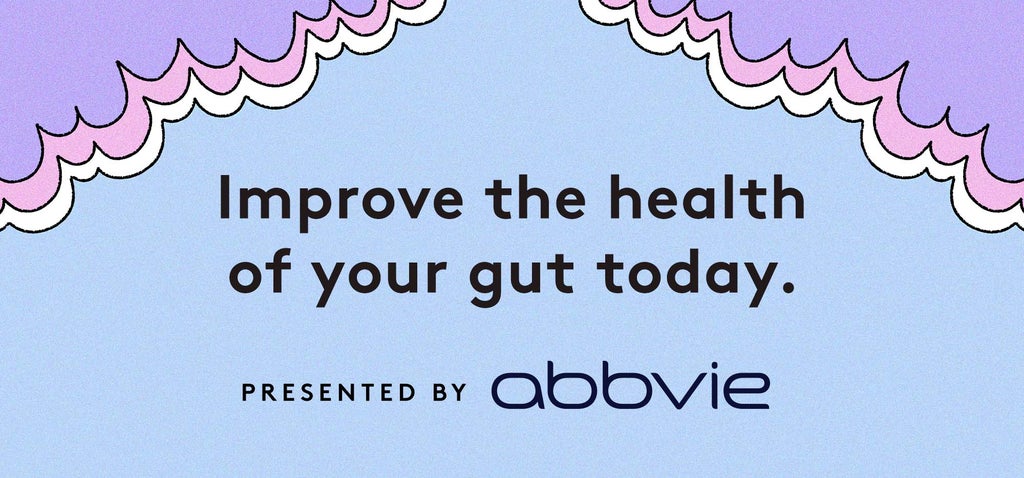Earlier this year, I was gearing up for what I thought would be an epic, hot girl summer (despite high levels of stress from work and everything that comes with re-emerging from a pandemic) when I ended up in the hospital at 3 a.m. for severe stomach pain. It turned out I was experiencing acid reflux, which is when the acid from the stomach bubbles up into the esophagus, causing a painful burning behind the breastbone. How’s that for hot?
I had been ignoring the warning signs — literally not listening to my gut — when I could’ve been taking precautions the same way I religiously follow my skin-care routine.
With that, I rounded up the following tips I learned to help my improve my gut health — and yours! I spoke with Dr. Megan Rossi, founder of The Gut Health Clinic in London and author of Love Your Gut, for easy ways to improve gut health and, ultimately, understand the gut’s direct impact on overall well-being.
Keep A Diverse Diet

While eating probiotic-packed food is a no-brainer for gut health, Dr. Rossi says eating a variety of foods is more effective than chowing down on the same veggie dish night after night. “If you’re only eating broccoli, you aren’t receiving a wide variety of digestive proteins,” she says. “The more diversity of the plants you’re eating, the more you’re helping your gut microbiota, which you want to keep happy.”
When you change up the types of vegetables you eat, you also get the added benefit of expanding your taste buds, which play an important role in nutrient absorption. For example, Dr. Rossi starts her day by eating fermented food like yogurt and overnight oats, but changes up her toppings — mixed seeds and nuts — depending on her mood.

Chew Your Food Well — Really Well
How many times do you chew each bite of food? Dr. Rossi says you should be aiming for 20 to 30 chews per bite. “We have enzymes in our saliva to break down the food, so you need to give it time to do its job,” she says.
Dr. Rossi doesn’t expect you to count each of your chews for every meal, but remaining conscious of how you eat rather than scarfing your food down can make a difference in how your stomach breaks it down. This will cut back on bloating and general stomach pain. At your next meal, consider counting your bites to get a sense of how long you chew your food for and then work from there.
Support Two-Way Communication Between Your Gut & Brain

Did you know that your digestive system is directly connected to your brain? The brain-gut connection is established through the vagus nerve, which oversees a vast array of crucial bodily functions, including digestion.1 This connection means your gut can react to stressors with symptoms like stomach pain, changes in appetite, and diarrhea. This is good news, though: In the SMILES trial2, a study that investigated the effectiveness of an improved diet for the treatment of major depressive episodes, the results showed that if you prioritize your gut health and maintain a high-fiber diet, you can directly improve your mental health.
A way to combat gut-related symptoms is by incorporating relaxation techniques into your routine. Dr. Rossi says one way to do this is through belly breathing, also known as diaphragmatic breathing, a technique that allows your breath to travel deep into your diaphragm. Gut-directed yoga flow3 is also particularly helpful as it can calm the overactivity of the sympathetic nervous system.

Enjoy Your Food (Seriously)
Don’t obsess over what’s considered “good” or “bad” food because the food itself is not the problem — the same way there is no such thing as “bad” emotions. Dr. Rossi says thinking this way can bring out the nocebo effect, a psychological occurrence where negative outcomes occur due to expectations that it will cause harm — the opposite of placebo.
“Studies4,5 show that if you feel guilt around what you’re eating rather than simply enjoying it, your stomach will tense up, causing you to bloat,” Dr. Rossi says. “Crazy, restrictive diets just don’t help. If you’re craving chocolate, try enjoying it with pistachios and some dried mangos so you can bring a plant variety to the snack. Food is meant to be pleasurable.”
Be Your Own Advocate
If you’re struggling, be open and honest with your primary care doctor who can recommend a specialist for you to speak with. Symptoms can sneak up on you if you let them fade into the background. Track your symptoms in a journal so you don’t risk settling into a “new normal” where you find yourself simply coping with your symptoms rather than treating them.

“Check in with your gut even if your symptoms don’t appear to be obviously gut-related. You’d be surprised how many of our ailments go back to our gut health,” Dr. Rossi says.
It may even be possible to develop a larger medical issue, such as IBS (irritable bowel syndrome), Crohn’s disease or ulcerative colitis. If not treated appropriately, these progressive digestive diseases can worsen over time. In addition to sharing your physical symptoms with your doctor, also make sure to explain how they may be impacting your day-to-day routine and overall emotional well-being. If you have Crohn’s disease or ulcerative colitis, you and your doctor can discuss the risks and benefits of treatment options, such as HUMIRA® (adalimumab). HUMIRA is a prescription medicine used for treatment of moderate to severe Crohn’s disease in adults and children 6 years of age and older and moderate to severe ulcerative colitis (UC) in adults and children 5 years of age and older.
Please see Humira Use and Important Safety Information below.
For more information about a treatment option, visit HUMIRA.com. HUMIRA is a biologic that blocks a source of inflammation that may be contributing to symptoms of Crohn’s disease. HUMIRA is not right for everyone. Only your doctor can decide if HUMIRA is right for you. Individual results may vary.
HUMIRA USE6
– HUMIRA is a prescription medicine used to treat moderate to severe Crohn’s disease (CD) in adults and children 6 years of age and older.
– HUMIRA is a prescription medicine used to treat moderate to severe ulcerative colitis (UC) in adults and children 5 years of age and older. It is not known if HUMIRA is effective in people who stopped responding to or could not tolerate anti-TNF medicines.
Important Safety Information About HUMIRA® (adalimumab)6
What is the most important information I should know about HUMIRA?
You should discuss the potential benefits and risks of HUMIRA with your doctor. HUMIRA is a TNF blocker medicine that can lower the ability of your immune system to fight infections. You should not start taking HUMIRA if you have any kind of infection unless your doctor says it is okay.
– Serious infections have happened in people taking HUMIRA. These serious infections include tuberculosis (TB) and infections caused by viruses, fungi, or bacteria that have spread throughout the body. Some people have died from these infections. Your doctor should test you for TB before starting HUMIRA, and check you closely for signs and symptoms of TB during treatment with HUMIRA, even if your TB test was negative. If your doctor feels you are at risk, you may be treated with medicine for TB.
– Cancer. For children and adults taking TNF blockers, including HUMIRA, the chance of getting lymphoma or other cancers may increase. There have been cases of unusual cancers in children, teenagers, and young adults using TNF blockers. Some people have developed a rare type of cancer called hepatosplenic T-cell lymphoma. This type of cancer often results in death. If using TNF blockers including HUMIRA, your chance of getting two types of skin cancer (basal cell and squamous cell) may increase. These types are generally not life-threatening if treated; tell your doctor if you have a bump or open sore that doesn’t heal.
What should I tell my doctor BEFORE starting HUMIRA?
Tell your doctor about all of your health conditions, including if you:
– Have an infection, are being treated for infection, or have symptoms of an infection
– Get a lot of infections or infections that keep coming back
– Have diabetes
– Have TB or have been in close contact with someone with TB, or were born in, lived in, or traveled where there is more risk for getting TB
– Live or have lived in an area (such as the Ohio and Mississippi River valleys) where there is an increased risk for getting certain kinds of fungal infections, such as histoplasmosis, coccidioidomycosis, or blastomycosis. These infections may happen or become more severe if you use HUMIRA. Ask your doctor if you are unsure if you have lived in these areas
• Have or have had hepatitis B
• Are scheduled for major surgery
• Have or have had cancer
• Have numbness or tingling or a nervous system disease such as multiple sclerosis or Guillain-Barré syndrome
• Have or had heart failure
• Have recently received or are scheduled to receive a vaccine. HUMIRA patients may receive vaccines, except for live vaccines. Children should be brought up to date on all vaccines before starting HUMIRA
• Are allergic to rubber, latex, or any HUMIRA ingredients
• Are pregnant, planning to become pregnant, breastfeeding, or planning to breastfeed
• Have a baby and you were using HUMIRA during your pregnancy. Tell your baby’s doctor before your baby receives any vaccines
Also tell your doctor about all the medicines you take. You should not take HUMIRA with ORENCIA® (abatacept), KINERET® (anakinra), REMICADE® (infliximab), ENBREL® (etanercept), CIMZIA® (certolizumab pegol), or SIMPONI® (golimumab). Tell your doctor if you have ever used RITUXAN® (rituximab), IMURAN® (azathioprine), or PURINETHOL® (mercaptopurine, 6-MP).
What should I watch for AFTER starting HUMIRA?
HUMIRA can cause serious side effects, including:
– Serious infections. These include TB and infections caused by viruses, fungi, or bacteria. Symptoms related to TB include a cough, low-grade fever, weight loss, or loss of body fat and muscle.
– Hepatitis B infection in carriers of the virus. Symptoms include muscle aches, feeling very tired, dark urine, skin or eyes that look yellow, little or no appetite, vomiting, clay-colored bowel movements, fever, chills, stomach discomfort, and skin rash.
– Allergic reactions. Symptoms of a serious allergic reaction include hives, trouble breathing, and swelling of your face, eyes, lips, or mouth.
– Nervous system problems. Signs and symptoms include numbness or tingling, problems with your vision, weakness in your arms or legs, and dizziness.
– Blood problems (decreased blood cells that help fight infections or stop bleeding). Symptoms include a fever that does not go away, bruising or bleeding very easily, or looking very pale.
– Heart failure (new or worsening). Symptoms include shortness of breath, swelling of your ankles or feet, and sudden weight gain.
– Immune reactions including a lupus-like syndrome. Symptoms include chest discomfort or pain that does not go away, shortness of breath, joint pain, or rash on your cheeks or arms that gets worse in the sun.
– Liver problems. Symptoms include feeling very tired, skin or eyes that look yellow, poor appetite or vomiting, and pain on the right side of your stomach (abdomen). These problems can lead to liver failure and death.
– Psoriasis (new or worsening). Symptoms include red scaly patches or raised bumps that are filled with pus.
Call your doctor or get medical care right away if you develop any of the above symptoms.
Common side effects of HUMIRA include injection site reactions (pain, redness, rash, swelling, itching, or bruising), upper respiratory infections (sinus infections), headaches, rash, and nausea. These are not all of the possible side effects with HUMIRA. Tell your doctor if you have any side effect that bothers you or that does not go away.
Remember, tell your doctor right away if you have an infection or symptoms of an infection, including:
– Fever, sweats, or chills
– Muscle aches
– Cough
– Shortness of breath
– Blood in phlegm
– Weight loss
– Warm, red, or painful skin or sores on your body
– Diarrhea or stomach pain
– Burning when you urinate
– Urinating more often than normal
– Feeling very tired
HUMIRA is given by injection under the skin.
This is the most important information to know about HUMIRA. For more information, talk to your health care provider.
Please see the Full Prescribing Information and Medication Guide.
You are encouraged to report negative side effects of prescription drugs to the FDA. Visit http://www.fda.gov/medwatch or call 1-800-FDA-1088.
If you are having difficulty paying for your medicine, AbbVie may be able to help. Visit AbbVie.com/myAbbVieAssist to learn more.
Sponsored by AbbVie

References
1. Breit S, Kupferberg A, Rogler G, Hasler G. Vagus Nerve as Modulator of the Brain-Gut Axis in Psychiatric and Inflammatory Disorders. Front Psychiatry. 2018;9:44. Published 2018 Mar 13. doi:10.3389/fpsyt.2018.00044
2. Jacka FN, O’Neil A, Opie R, et al. A randomised controlled trial of dietary improvement for adults with major depression (the ‘smiles’ trial). BMC Medicine. 2017;15(1). doi:10.1186/s12916-017-0791-y
3. Kavuri V, Raghuram N, Malamud A, Selvan SR. Irritable Bowel Syndrome: Yoga as Remedial Therapy. Evid Based Complement Alternat Med. 2015;2015:398156. doi:10.1155/2015/398156
4. Konturek PC, Brzozowski T, Konturek SJ. Stress and the gut: pathophysiology, clinical consequences, diagnostic approach and treatment options. J Physiol Pharmacol. 2011;62(6):591-599.
5. Gouin J-P, Hantsoo LV, Kiecolt-Glaser JK. Chapter 54 stress, negative emotions, and inflammation – osumc.edu. http://pni.osumc.edu/KG%20Publications%20(pdf)/195.pdf.
6. HUMIRA Injection [package insert]. North Chicago, IL : AbbVie Inc.
Like what you see? How about some more R29 goodness, right here?
from Refinery29 https://ift.tt/3yONYiW
via IFTTT

